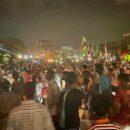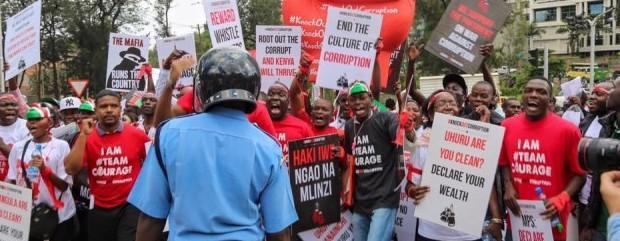Rwanda isn’t opposed to international justice, it’s opposed to independent justice

Rwanda claims its withdrawal from an African Court declaration just as that court was about to begin Victoire Ingabire’s hearing was pure coincidence.

At the trial of Victoire Ingabire in 2011. Credit: Graham Holliday.
During an African Union (AU) summit in early February, it was decided that Foreign Ministers would prepare a roadmap for the continent’s withdrawal from the International Criminal Court (ICC).
The reason for this move, according to a growing group of African leaders, is that the ICC is “anti-African”, “humiliating” and a threat to sovereignty. This argument refers to the fact that most of those indicted or being investigated by the Court are African, though given that the victims of the abuses focussed on by the ICC are also mostly African, from a people’s perspective, the ICC could be seen as distinctly “pro-African”.
Nevertheless, plans were put in place for the AU to abandon the ICC – even though only individual states can withdraw, not the Union as an organisation – and to set up an alternative African court, one that is expected to offer immunity to the continent’s Big Men.
In these decisions, one of the most prominent voices was President Paul Kagame, even though Rwanda is not party to the Rome Statute in the first place. Kagame has criticised the ICC for being “selective” and discriminating against the continent.
However, recent events suggest that the president is not just worried about the international court, but African courts as well. Or rather, it seems that the thing Kagame is really concerned about is not international justice or African justice, but independent justice.
“Without merit”
Victoire Ingabire, one of Rwanda’s few opposition leaders, is currently languishing in jail, serving a 15-year prison term for “conspiracy against the country through terrorism and war” and “genocide denial”. These charges are widely believed to be politically-motivated and the judicial process that convicted Ingabire was deeply politicised and marred by executive interference, including by Kagame himself.
In light of her sentencing then, Ingabire filed an application with the African Court on Human and Peoples’ Rights (ACHPR), seeking several orders and remedies. The case was eventually set for a hearing on 4 March 2016.
As this date approached, Ingabire’s legal team were clearly obstructed. In February, her lawyer was searched and his legal papers read by police. He was refused access to his client to prepare the case, and the prison management drastically reduced her visiting regime. Ingabire’s Dutch co-counsel was also declined a visa, thus preventing her from preparing the case with her client. Rwanda had also previously sent a 24-page response to Ingabire’s application asking the court to declare it “vexatious, frivolous and without merit” and dismiss it.
Finally, on 29 February, just days before the trial was due to start in Arusha, Rwanda decided to opt out of the declaration it made in 2013 that allowed individuals to institute proceedings in application of article 34(6) of the Protocol on the Establishment of an African Court on Human and Peoples’ Rights. At more or less the same time, Benin was joining the seven African countries that signed up to the declaration.
As the case was initiated before Rwanda opted out, it remains to be seen whether the country’s withdrawal will prevent the court from examining Ingabire’s application or not.
On Safari
As the African Court on Human and Peoples’ Rights is as African as the baobab tree, what these events suggest is that Rwanda’s problem is not with any sense of anti-African bias or external interference into the continent’s affairs. Rather, what it fears is independent justice and the possibility that the African court might act impartially, unlike Rwanda’s domestic courts, and expose the political nature of Ingabire’s conviction.
In its justification for withdrawing from the court, the Rwandan government has attempted to suggest the move has nothing to do with Ingabire. It claimed instead that “the decision to withdraw from the declaration was reached after a genocide convict and fugitive secured a right to be heard” in a separate case. Referring to a complaint brought by Stanley Safari, a former senator convicted of killing Tutsis during the 1994 genocide, Rwanda’s Justice Minister stated that the government “informed the Court last year that we would take serious exception if Safari was allowed a platform in the African court”.
However, Rwanda never suggested it would withdraw from the declaration. And even if it had, the timing of Rwanda’s decision to act on its concerns from “last year” and withdraw just as the controversial and potentially significant Ingabire case was due to begin would be one huge coincidence.
The reality is that to believe the official account would of course be naïve, and what this whole saga really reveals is how little confidence the Rwandan government has in the quality of its own justice system. This should make third countries think twice before granting extradition requests on the basis of assurances by the Rwandan government about judicial fairness and independence.
(Two major Rwandan officials were asked to comment on a draft of this paper, but they did not answer repeated requests.)







Rwanda has no fiable justcice. It is a totaritarianl dictatorship ,and people are afraid to speak up for their rights. The crime of genocide has been a tool to silence anybody who dares to criticise the system. No democracy, no freedom of expression and opinions,no justice at all.The leaders of Rwanda cannot admit their faillure to ensure justice for all, to respect human rights for all rwandans,,to live in harmony with our neighboring countries such as RDC and Burundi, etc…They think they are above the law and untouchable.
I m sure the author of this article does nt know genocide against Tusti in Rda or is ignoring it. It’s horrible and Stanely was convicted while Ingabire denied it in public. Hw can Rda and African countries (courts) can give a platform to such people
MR. Filip Reyntjens, Where were you when poor leadership of Rwanda before 1994 Genocide against the Tutsi perpetrated their heinous plans! Where were your such articles?
There is zero tolerance to anything that might want to divide the people of Rwanda, zero tolerance to any people who for their personal interests and greed want to climb the ladder of politics using divisive means that might kill our country again.
Such annoying uninformed or informed but evil minded genocidaires articles!
No wonder this is from Phillip Reyntjens, what else would his readers expect him to write? if it was someone else I would be able to comment.
no wonder its Filip Reyntjens , what else do his readers expect him to write? any thing to do with Rwanda just consider what he wrote 20 years ago. It is the same hate stories.
This observation could not have come at a better time! The Rwanda genocide has been superseded by TUTSI hegemony throughout the The Great Lakes Region now. Look at what is happening in Uganda right now. The International Community will be shocked at what they will learn in a couple of months from now. let us hope it won’t be too late then.
African leaders must decide whether they want to be tried at the Hague or whether their countries must answer questions before the African Court on Human and Peoples’ Rights.
Withdrawal from the ICC will be an act of cowardice on the part of African leaders, withdrawal from the African Court is shameful. The issue is, efforts must be made to put these leaders on trial for human rights violations, crimes against humanity, war crimes and genocide. It must begin with the ratification of the Protocol establishing the African Court and the making the declaration under Article 34(6) of the Protocol to allow individuals and NGO’s to file cases before the Court.
The solution therefore lies in a relationship of complementarity between the ICC and the African Court. Such a relationship, if properly defined, will ensure that all culprits will answer for the crimes they commit…that will be international justice.
@David, How dare you asking Pr Reytjens where he was before and during 1994 genocide against the Tutsis? He was busy developing an apartheid like and one party constitution, confirming the supremacy of Hutus and MRND as one party for all Rwandans, including those yet to be born, he was busy building systems to excluding Rwandan Tutsi in any state affairs and access to basic rights like education, he was busy helping build system and reinforcing the exclusion of Tutsi living abroad as refugees for 34 years. He was part of the cabinet advisor to Habyalimana, helping build his fascist system. Yes, that’s Reytjens .
To Andre and David,
We, Rwandans, are not fool as you may think. Senator Stanley who served in Kagame’s government for many years became a genocidaire after disagreeing with regime and fleeing the country. How about the genocidaire status of fomer premier minister Pierre celestin Rwigema? Since he joined back the regime, is he still a genocidaire or not ? I need a honest answer from you two guys on this. Now, if Kagame thinks ICC is anti-African court- he is partially right because Irak and Libya were not chaotic as they are now. ICC should look for who are responsible for this chaos. Every one knows who are responsible but for sure it is not Sadam for Irak or Kadhafi for Libya-, he should respect African courts.
It is a pity that those trying to defend the RPF resort to lies and character assassination instead of going into substance. I (again) add a brief paper on the truth about my role in pre-genocide Rwanda. It is over 15 years old but still relevant, and unfortunately availabe in French only.
https://www.uantwerpen.be/images/uantwerpen/container15163/files/Proc%C3%A8s%20d'intention.pdf
@ John you are probably a blind fan. Do not attack Pr Reytjens, please attack his idea. Prove whether what he says is true or false. You think you are supporting the regime in place, but you are sinking it in hot water.
Rwanda: Se How you Can Cover Up Hutu Genocide.
Kibeho – The Real Story of What Happened There in 1995
image
Kibeho – The Real Story of What Happened There in 1995
Afficher sur http://www.youtube.com
Aperçu par Yahoo
Corps du mail
U.S. Backed U.N. General Despite Evidence of Abuses
image
U.S. Backed U.N. General Despite Evidence of Abuses
UNITED NATIONS — The Bush administration’s support for the appointment of a Rwandan general to a top U.N. peacekeeping job in Sudan last year came despite a …
Afficher sur http://www.washingtonpo...
Aperçu par Yahoo
Rwanda: The extermination of Hutu People, choking story!
Kibeho – The Real Story of What Happened There in 1995
image
Kibeho – The Real Story of What Happened There in 1995
Afficher sur http://www.youtube.com
Aperçu par Yahoo
Rwanda’s Untold Story Documentary
image
Rwanda’s Untold Story Documentary
Afficher sur vimeo.com
Aperçu par Yahoo
The Extermination Plan of Hutu People of Rwanda: some Pictures
Raising consciousness about the challenge of the Congo – UN Report Multimedia
image
Raising consciousness about the challenge of the Congo -…
UN Report Multimedia Below is a collection of audio and video interviews regarding the United Nations Mapping report: Interview with Navi Pillay, UN High Commi…
Afficher sur http://www.friendsofth...
Aperçu par Yahoo
http://www.mdrwi.org/images/photos/terrorrpf.jpg
Image en ligne
Image en ligne
« 24 years of Genocide against the Hutus
Who’s been setting Rwandan jails on fire
during the World Cup 2014? »
Second Genocide in Rwanda? Slow, Silent, and Systematic?
image
Second Genocide in Rwanda? Slow, Silent, and Systematic?
What is happening in Rwanda? On Aug. 26, the BBC reported that Burundian officials are investigating to determine why Rwandan bodies have been found floating i…
Afficher sur http://www.globalresea...
Aperçu par Yahoo
The Truth Behind the RWandan Tragedy by Remigius Kintu
A must read by Remigius Kintu.
Hungry for Truth, Peace and Justice: The Truth Behind The Rwandan Tragedy
http://www.rwandadocumentsproject.net/gsdl/collect/comment/index/assoc/HASH4e91.dir/Espana-Audiencia%20nacional-English%20version.pdf